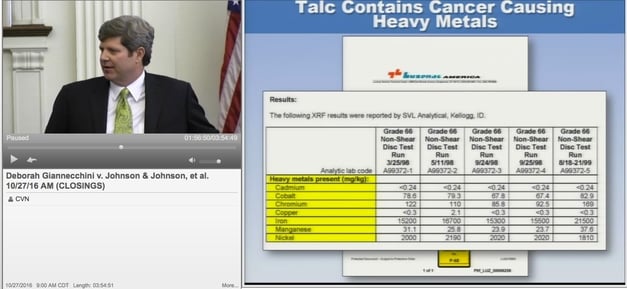
Screenshot of CVN coverage during closing arguments in October from a prior talc powder trial
St. Louis — The fourth lawsuit out of thousands filed against Johnson & Johnson over the alleged cancer risks from prolonged use of popular personal hygiene products containing talc powder goes to trial later this month in Missouri state court, and the full trial will be webcast live gavel-to-gavel by Courtroom View Network.
Three similar trials in 2016 resulted in combined damages of over $190 million, and J&J is eager to break the plaintiffs' winning streak in St. Louis, where the majority of pending talc cases are filed. The drug company, along with talc supplier Imerys, is accused by thousands of women of knowingly concealing the danger of ovarian cancer associated with the use of well-known household products like Johnson & Johnson’s Baby Powder and Shower to Shower.
Plaintiffs allege J&J for years ignored compelling scientific evidence that talc powder applied to the genitals could travel to the ovaries and cause cancer, and that the company wanted to protect the profits generated by brands consumers had purchased for decades even as safer cornstarch-based body powders became available.
Nora Daniels, 56, filed the pending case after using J&J’s talcum powder for 36 years. However J&J and Imerys maintain her ovarian cancer wasn’t caused by talc. They cite that the U.S. Food & Drug Administration held hearings in the 1990’s on the risks of talc and concluded it was safe, and that there is no conclusive evidence of a link between talc-powder-based hygiene products and ovarian cancer.
Jury selection before Judge Rex Burlison, the same judge who presided over the previous three trials, is scheduled to begin on January 30 with opening statements scheduled for February 6.
Given the widespread use of talc powder, this litigation has the potential to become one of the largest mass torts to sweep the country in decades. Daniels’ attorney Ted Meadows of the firm Beasley Allen, which handled the previous three trials in St. Louis, told Courtroom View Network that his firm alone has received over 32,000 talc-related inquiries with nearly 1,000 cases already filed.
“Tragically, these cases are not going away,” Meadows said. “The science linking talc to ovarian cancer is too strong. When jurors are presented with the scientific evidence and evidence that J&J knew and understood the threat to its customers, and did nothing, they vote to compensate the victim.”
Meadows said that aside from a few witnesses, the core of the case would be the same as the previous three trials, two of which were also webcast and recorded by CVN. He noted that the pending case is a defense pick, meaning that a fourth plaintiff verdict in a case J&J deemed more favorable to them would cement cancer victims’ already strong advantage heading into any potential large scale settlement.
The trial will also be a test to see if plaintiffs can again succeed in assigning liability to both J&J and Imerys. A jury in October for the first time found Imerys partially responsible for a woman’s cancer after clearing the company in the two previous state court trials.
J&J spokesperson Carol Goodrich told CVN that the company is appealing those verdicts.
“We are defending the safety of Johnson’s Baby Powder because science, research, clinical evidence and decades of studies by medical experts around the world continue to support the safety of cosmetic talc,” Goodrich said. She added that last year a New Jersey state court judge threw out two talc cases on the grounds that key expert testimony for the plaintiffs wasn’t backed up by adequate scientific evidence. The witnesses were permitted to testify in Missouri.
The New Jersey judge’s decision, also on appeal, makes St. Louis ground zero for the nearly 2500 pending talc cases in the country, with cases also pending federal multidistrict litigation consolidated in New Jersey and a growing batch of state court cases in California.
A federal trial in South Dakota in 2013 resulted in J&J being found liable, but the jury awarded no damages.
Meadows said that a company the size of J&J could afford to write off the massive legal fees associated with these trials as “the cost of doing business” but also noted that as the number of cases continues to explode, a consensus is building that “something must be done.”
“If the company won’t do it, the courts and juries will,” he said.
For access to gavel-to-gavel video of the full trial, along with previous talc cases and hundreds of other real-world, high-stakes civil trials in courts throughout the United States, become a subscriber to CVN’s one-of-a-kind online video archive for as low as $99/month.
The pending case is captioned Valerie Swann, et al. v. Johnson & Johnson, et al. case number 1422-CC09326-01 in Missouri’s 22nd Judicial Circuit Court.
Email David Siegel at dsiegel@cvn.com





